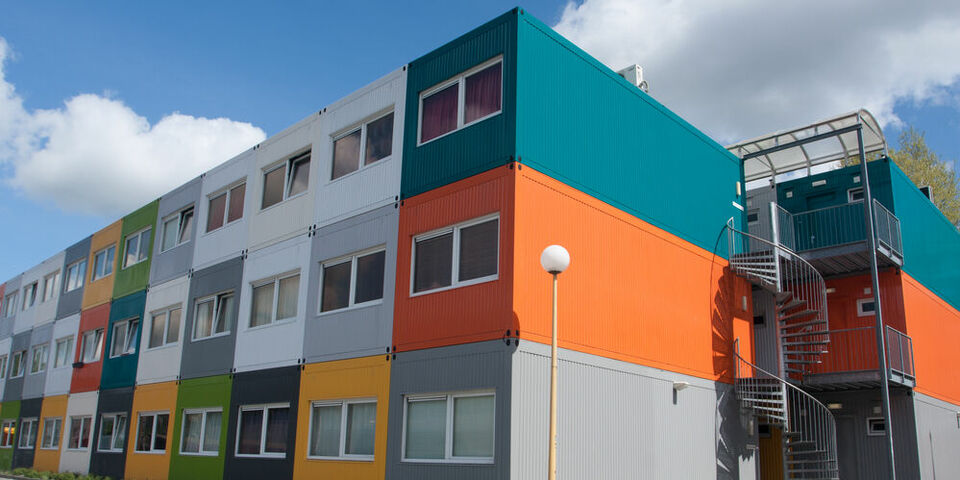Possible return of temporary housing units on campus
The ever-increasing demand for housing among international students in particular has become a cause of great concern for TU/e’s Executive Board. Vice-president Nicole Ummelen told the University Council last week that TU/e is once again considering placing temporary housing units on campus. In mid-June, internationals who are planning to start with their studies in September received an email in which they are strongly advised not to travel to Eindhoven if they are unable to find accommodation by August the 1st.
During this academic year’s final University Council meeting, Martijn Klabbers of staff faction PUR asked the Executive Board what actions it will undertake to be able to provide international students who are planning to come to Eindhoven upcoming academic year with suitable accommodation. Vice-president Nicole Ummelen said that the university is talking to several parties, including the municipality and various housing corporations, but that a solution to this problem is not forthcoming.
Ummelen said that a proven construction, according to which internationals received a rental contract for the duration of one year and had to find a suitable accommodation by themselves, no longer works. “We see that many of these students are unable to find accommodation within a year. We can’t put them out into the street after their one-year rental contract expires, which is why they continue to live in units that are really supposed to go the new group of students.”
Patrick Groothuis, director of Education and Student Affairs (ESA), gives further clarification: “In the past, the university was able to guarantee a contingent of student dwellings, which we offered to approximately forty percent of international students as a landing place for the duration of one or two years. The remaining sixty percent managed to find an accommodation on their own. Today, it has become much more difficult for current tenants to find new accommodation, which is why the gap between supply and demand has become even wider, and TU/e is also no longer able to accommodate that forty percent.”
Letter
On June 15, international students who indicated that they wished to start with their studies in September, received a letter from TU/e in which they were informed of the above-mentioned housing problems and the precarious situation in Eindhoven. The university also writes that it expects to be able to help only five to ten percent of international students in their search for accommodation. ‘We find this regrettable and we understand the feelings of disappointment this might cause, but the current housing market situation leaves us no other option,’ the letter says. Internationals who haven’t found accommodation by August 1, are strongly advised not to come to Eindhoven.
Ummelen and Groothuis point out that student housing shortage affects university towns across the Netherlands, and that the country as a whole is struggling with this problem – and that the Brainport region only complicates matters even further. “Ummelen: “It’s not just the university that’s growing when it comes to international inflow, but the companies surrounding us are also recruiting people from abroad. Those expats need to live somewhere too. That only increases the problems in the housing market, which is tight enough as it is.”
Temporary housing units
One of the short-term solutions the university is looking into as a final option, Ummelen said, is the possibility of placing temporary housing units on campus or at other locations in the city. Six years ago, TU/e said farewell to the so-called space boxes, which had served as temporary housing units mostly for international students over an eleven-year period. Groothuis says that the university is working hard at this moment to realize temporary housing units on campus for approximately one hundred students. “We have two locations in mind,” the ESA director says, “which we will look at together with a group of students. We’re also discussing this matter with the municipality, because of the required permits.”
Last week, Ummelen reiterated the university’s plan to build two new residential towers with over seven hundred extra units on campus in 2024. “Until that time, however, this will continue to be an enormous challenge for us.”
Exchange programs
Meanwhile, lecturers are getting worried about students from European exchange programs, who won’t be able to find housing in Eindhoven to continue with their programs and therefore might be forced to reimburse their scholarships. This problem was also addressed by PUR faction member Klabbers. The situation applies to students from the KICs (Knowledge and Innovation Communities) programs, during which students follow a part of their master’s program at two European institutions, and the Erasmus+ program. Klabbers asked the Executive Board whether it would be possible to give these students priority when allocating accommodation.
Groothuis says that in principle it is a student’s own responsibly to find accommodation and that this applies to every university in the Netherlands. “It’s true, though, that it has become increasingly difficult to find a room, and that is why it’s important for students to realize that they should only come to Eindhoven coming academic year if they have accommodation. If not, it would be wise to consider other options.” Practically every university in the country has issued a similar message, Groothuis says. He continues: “An argument could be made for more than one group, or parts of a group, that they may or may not be eligible for prioritization in addition to the groups that have already been mentioned, and that makes it impossible right now to put this into practice. That is why the Executive Board decided not to make a distinction at this point.”


Discussion